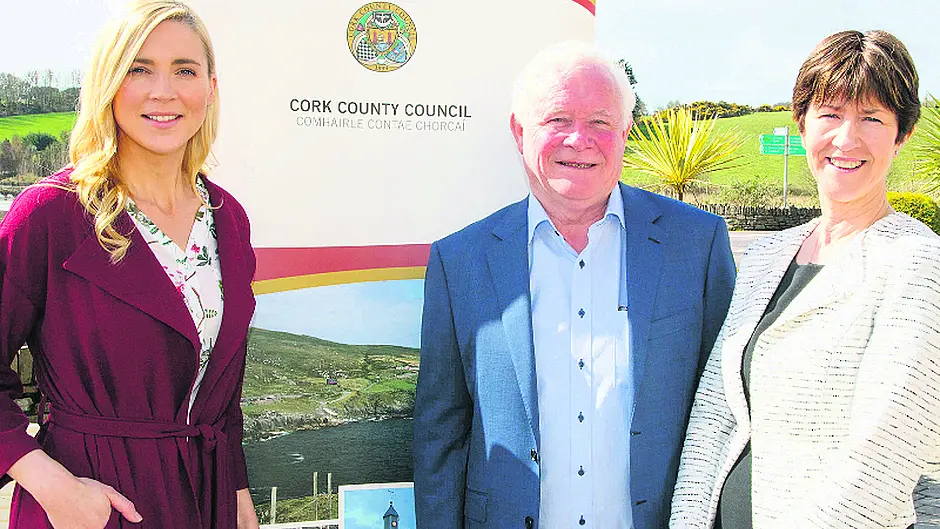A change in policy by Cork County Council is yielding results, the woman tasked with keeping the county clean tells Siobhán Cronin
THE blight of litter is something that The Southern Star has been highlighting in recent years.
With the spring comes hedge-cutting and road maintenance, and with that comes the exposure of several hundred kilometres of road verges. Unfortunately, that also means the acres of litter which have been tossed into hedges and ditches all year long are also now exposed.
Cutbacks in funding to local authorities and, by filteration, to the individual departments like environmental services, mean that policing of littering is becoming increasingly difficult.
The business of cleaning-up after uncivic-minded citizens has also come under pressure from reduced funding, and we have not quite reached the situation in Ireland whereby littering is politically incorrect, like smoking in public buildings or drink driving.
Roadsides in tourism-dependent countries like France and Spain seem immaculate compared with our plastic bottle-strewn road margins, also a dumping ground for coffee cups and takeaway debris.
There seems to be little joined-up thinking by government, which refuses to see the link between cutbacks to local authorities, littering, tourism and jobs. In an area like West Cork, which is so heavily-dependent on the tourist industry, ignoring the plague on the sides of our roads is a recipe for disaster.
In a bid to make tight resources stretch further, just over a year ago, Cork County Council made a daring change in opening hours at its amenity sites and diverted staff into four ‘clean-up fleets’ operating in four county regions – covering north, south, east and West Cork.
This bold move is now paying off, according to Sharon Corcoran, director of environmental services with Cork County Council.
All four fleets collected over 100 tonnes of discarded rubbish in just nine months, she pointed out. ‘We changed the opening times of our amenity centres last year,’ she explained, ‘and on the days they are closed the teams are out and about responding to calls. We found that this way the staff could be more productive and they have found they really enjoy it and there is a great satisfaction in the work.’
If they see something while on the way to a call – it could be a discarded sofa, television, fridge, or just several bags of rubbish – they will stop and load it up onto their truck, with their specialised equipment. But they can only operate on regional, not national, roads, she pointed out.
The national roads are under the auspices of the TII (formerly the NRA) but the Council will forward any information regarding fly-tipping along national roads to the TII.
‘There are over 1200km of national and regional roads in Cork County Council, so that’s a lot of area to cover,’ she pointed out.
Ms Corcoran paid tribute to Dr Mary Stack, the environmental awareness officer, for her educational work with the schools, and West Cork litter inspector Teddy Browne, but she admitted that getting successful prosecutions for litter was sometimes difficult.
‘If we see someone littering on the street we can issue an on-the-spot fine,’ she said, but agreed that fly-tipping was often done at night, under the cover of darkness.
She explained that when the West Cork clean-up crew is contacted to attend a scene, they are given the sat nav co-ordinates via a tablet from the base, and they go and bring the material back to the depot where it is examined for evidence. ‘Sometimes we find it, but sometimes we don’t. If we find it, we can bring a prosecution,’ she explained.
She said the Council had received ‘over 2,000 complaints’ since the helpline was set up, and had acted on them.
‘While Dr Stack and others have done a great job, it is a constant battle. What we really have to do is to get people to stop littering mindlessly,’ she said.
Ms Corcoran said that we need to address the scourge of littering in the same way as we did with drink-driving, smoking and plastic bags.
‘Yes, it is a battle, but it can be done,’ she said.
And she believes community involvement has a huge role to play. ‘Think of a green in a housing estate. If local people get together, be it one Saturday a month, or even every two months, a lot can done.’
And now anyone can help out – as part of the An Taisce-sponsored National Spring Clean month of April, groups can come together and get the appropriate equipment and bags via Cork County Council.
‘I would encourage groups to take up this option, and contact either their local area engineer or litter inspector Teddy Browne and let them know. We can arrange to have the bags picked up, so all people really need to give is their time.’
The Cork County Council litter helpline is 021 4285417 or report via email to [email protected]








